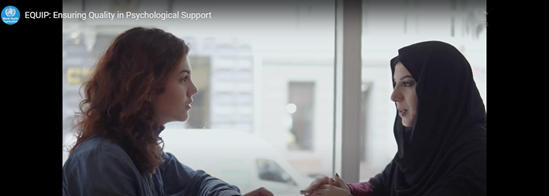EQUIP - Ensuring Quality in Psychological Support
EQUIP: Ensuring Quality in Psychological Support is a joint WHO/UNICEF project to improve the competence of helpers and the consistency and quality of training and service delivery. The EQUIP platform makes freely available competency assessment tools and e-learning courses to support governments, training institutions, and non-governmental organizations, both in humanitarian and development settings, to train and supervise the workforce to deliver effective psychological support to adults and children.
EQUIP used a consensus-building approach including key stakeholders to develop the evidence-informed competency-based training materials and guidance, as well as the competency assessment tools. These resources have been tested in Ethiopia, Jordan, Kenya, Lebanon, Nepal, Peru, Uganda and Zambia, with results demonstrating training improvements in groups that used the EQUIP platform. For example, use of EQUIP in Lebanon with children and adolescents led to an increase in mastery of core helping skills compared to standard training approaches.
In response to the COVID-19 pandemic, the EQUIP field and project teams developed a range of e-learning courses to support teams transitioning from face-to-face support to digital, or remote, support.
The EQUIP platform, which includes all competency assessment tools and e-learning courses, was made publicly available in early 2022 and will continue to evolve as feedback from users is collected.
WHO acknowledges USAID for financial support to the EQUIP project.
For more information about EQUIP contact Dr James Underhill (underhillj@who.int) at the WHO Department of Mental Health, Brain Health and Substance Use.
Read more about WHO’s work on mental health in emergencies

